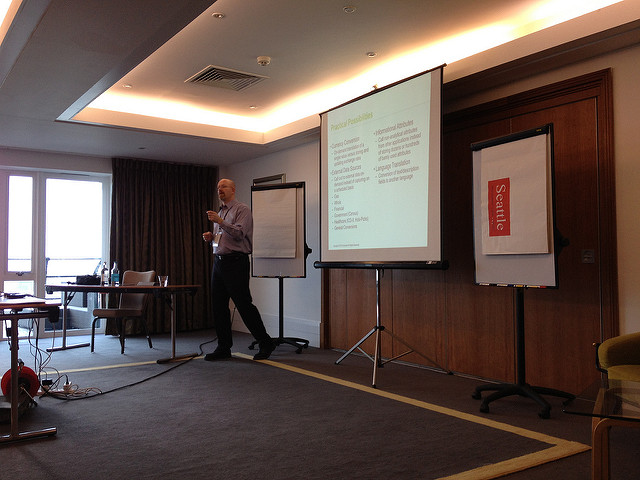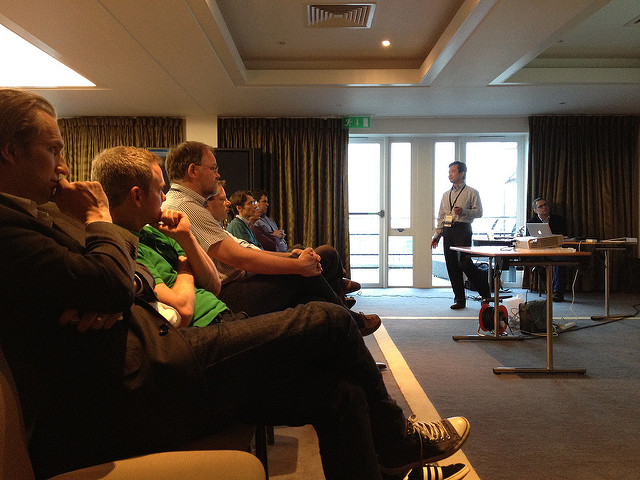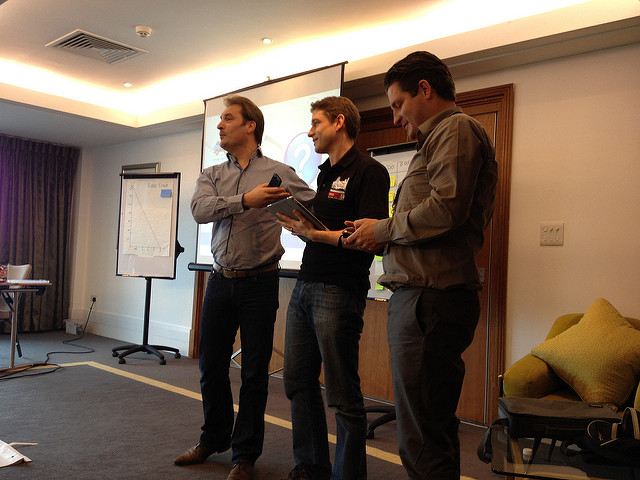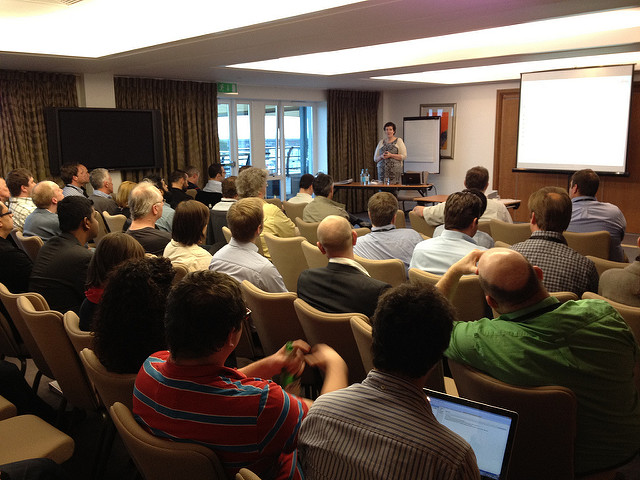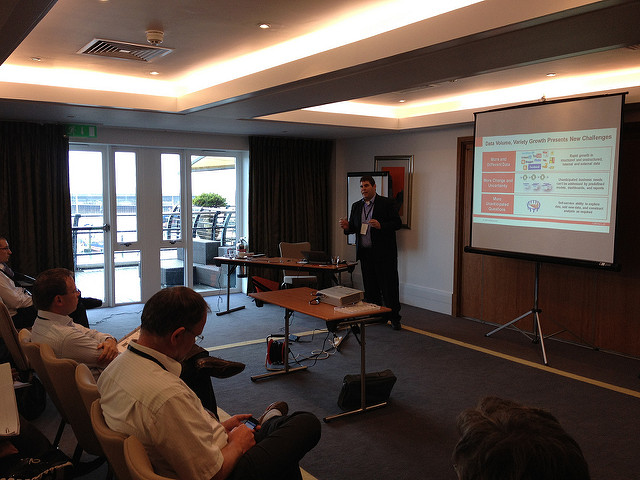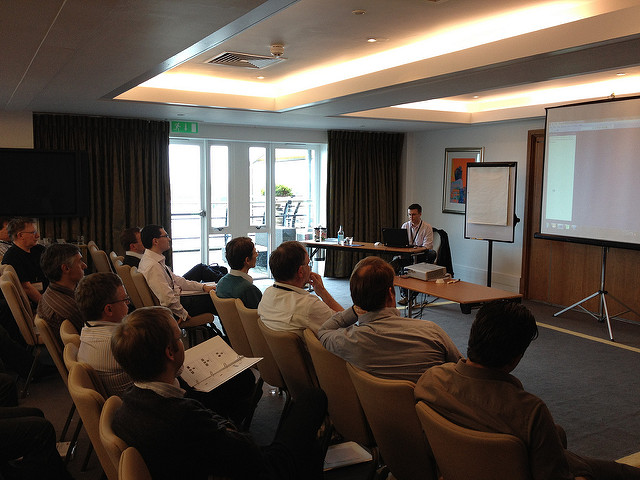The Rittman Mead BI Forum 2012 : Brighton's Over, Now off to Atlanta!
It's currently Saturday evening and I'm at home in Brighton, tying up loose ends after last week's BI Forum event and getting ready for next week's in Atlanta, GA. I think it's probably safe to say that this week's event was the best ever, and we're looking forward to flying over to Atlanta to do it all again!
The Rittman Mead BI Forum this year is running for four days at both venues, with the first day an optional OBIEE11g Masterclass by Kevin McGinley, and the final day being a BI Developer Day, held under NDA (non-disclosure agreement) in conjunction with Oracle BI product development. Around thirty people arrived either on Monday night or early Tuesday morning for Kevin's masterclass, which covered topics such as the OBIEE 11g Action Framework, Oracle Scorecard and Strategy Management and Oracle BI Mobile. Kevin won best speaker award at last year's US BI Forum event, and leads a team of developers and consultants at Accenture delivering OBIEE solutions around the US. Here's Kevin delivering his session, talking in this case about use-cases for the Action Framework beyond the typical "invoke marketing campaign from a link on the dashboard":
A big part of the BI Forum is the social and networking aspect, with in the case of the Brighton event around 75 BI developers from around Europe, the USA and India attending this year. An hour or so after the close of Kevin's keynote we assembled in the bar for the drinks reception, and then suitably lubricated convened back in the seminar room for the Oracle keynote, delivered this year by Alan Lee (Oracle BI Server PM) and Mike Durran (Oracle BI Principal Product Manager, looking after aspects of Exalytics). It was great to get Alan over as he's in the past been responsible for Essbase, and now he's looking after what is arguably the single most important component in the OBIEE architecture. Without breaking too many confidences, there was certainly a lively debate around Exalytics and the upcoming product roadmap, and this was a great venue for candid and informed discussions around Oracle's product strategy.
The main core sessions for the conference then started on Wednesday morning, with Tony Heljula opening the proceedings with a session on OBIEE 11g security, followed later in the day by Adam Ferrari (ex-Endeca CTO) on Oracle Endeca Information Discovery, Ayse Oztop on Oracle Scorecard and Strategy Management, and John Hollifield (Nominet) along with James Coyle and Adam Seed (Rittman Mead) with a customer case study around reporting packs and OBIEE 11g. One new thing we tried for this year's event was to run a number of ten-minute sessions, using the Ignite format (10 minutes, 20 slides that auto-advance every 30 seconds) on Wednesday and the TED format (10 minutes, no slides) on the Thursday. I think these worked - of course a lot of it was down to the presenter and the topic - but it was an opportunity to cover a lot of topics, and for speakers who didn't have the time to create an hour's worth of material but who had an interesting idea to get across. Thanks again to everyone who presented over the two days, and there's a Flickr photo set here - Rittman Mead BI Forum 2012, Brighton - if you want to take a look at photos of the presenters and the sessions. Congratulations also to Oracle ACE Emiel van Bockel from Centraal Boekhuis in the Netherlands who won the Best Speaker award for the best one-hour session, and Tony Heljula (Peak Indicators) and John Minkjan (Ciber) who tied as Best Speakers for the 10-minute sessions.
Another new idea we tried this year was to have a couple of guest speakers, coming from outside of our normal Oracle BI technical area. On the Wednesday evening therefore, before the main meal and after our main sessions for the day, we had Debra Lilley, Oracle ACE Director, Oracle Alliance Director for Fujitsu and President of the UK Oracle User Group, present to the forum on BI within the Oracle Fusion Applications. Debra has been working closely with Oracle through leading the Oracle Product Development Committee for the International Oracle Users Group Community (IOUC), and had a great story to tell the audience around OBIEE and Essbase are deeply embedded, and central, to the Fusion Apps suite.
I was keen to have Debra talk for a couple of reasons; firstly, I think it's good to bring in people who work outside the core OBIEE tech area and Debra is an accomplished speaker and advocate for users. Secondly though, it was particularly interesting to hear how all of the Fusion Middleware components that OBIEE 11g has adopted, such as Oracle Platform Security Services, Oracle WebLogic, Oracle Enterprise Manager and the Action Framework that links into them, are actually there because the Fusion Apps are the primary customer for OBIEE and it's in their set of requirements, with the spin-off benefit for us in that we get all of these enterprise features as part of the standard product. There is a method to the madness, so to speak, in all these new Fusion Middleware components coming into OBIEE, although it has to be said that there were several calls for a more simplified, cut-down version of OBIEE suitable for SMEs (something like the new BI Publisher trial version launched last week), maybe with a lightweight application server and without some of the complexities around security and so on, to compete with vendors such as Qliktech.
Qliktech, and their Qlikview product, came up in conversation earlier in the day when Adam Ferrari, now a VP within Oracle but previously the Chief Technology Officer for Endeca, presented on Oracle Endeca Information Discovery and the Endeca Server (aka MDEX) that powers it. Adam's a great speaker and stuck around for the whole conference, and he's also coming over to Atlanta next week to present the same session for the US audience. The development process for the Endeca Server is quite unlike that for traditional BI projects, with much less time spent on the data modeling part and a set of UI components that let you develop "search/analytical" applications using both structured, semi-structured and unstructured (almost) data.
Adam was also able to share a bit of the Endeca roadmap with the audience, including some initial thoughts on how the Endeca Server can leverage OBIEE's semantic layer, and how the BI Server might be able to access Endeca Server data, and how Endeca Latitude's style of search/analytical UI components are being rewritten to use Oracle ADF DVT technology. If you're interested in the Endeca Information Discovery story, we put together a week-long series of articles on the product a few months ago including this article on our thoughts on how Endeca will fit into the Oracle BI/DW product line, which also has links to all of the other postings.
Wednesday night was the gala meal, this time at the Havana Restaurant in Brighton, with delegates traveling into town after Debra's keynote and visiting our new offices on the way for a champaign toast. Thanks to Becky, Alex and everyone else back in the office for organizing the events this night, and also the various social events over the rest of the week. Here's a few photos from the meal, and from events during the rest of the Brighton BI Forum:
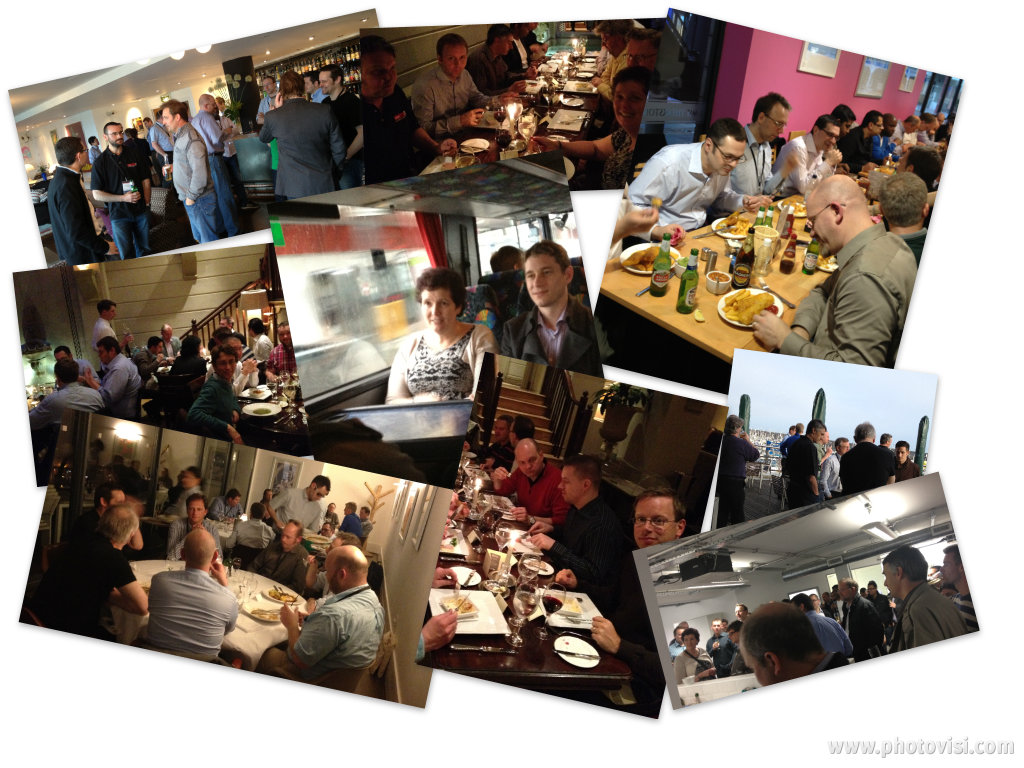
Our second guest speaker was on Thursday, and in a bit of a departure from our normal topics we had Chris Webb, a Microsoft MVP and owner of Crossjoin Consulting and Technitrain, to talk to us about the Microsoft BI stack. I've followed Chris' blog for some time and we've had kind-of parallel careers, with Chris specializing in Microsoft Analysis Services and Microsoft BI, whereas of course I've focused more on Oracle BI. I thought it'd be interesting to have someone come along and show how they do a similar job to us but with a different set of tools, and tell us what they thought was good about the product, what didn't work so well and how they typically approached projects. It was a bit of a gamble as to whether it would work, but it was actually one of the best received sessions of the week and helped us put Oracle's product direction, explained in detail during the final session on Friday, in context. I was particularly interested to hear Chris' take on the various changes happening to Analysis Services metadata over the past few years, introducing more relational and in-memory features, something Oracle of course did with Oracle OLAP / Oracle Express back in the 9i days, with mixed success (to put it diplomatically).
So the main BI Forum sessions finished on Thursday evening, but for around twenty of the delegates plus around five or so Rittman Mead staff, there was an extra day at the end which we'd organized in conjunction with Oracle BI product management. Held under non-disclosure, Alan Lee and the product team took us through a more detailed look at the product roadmap, and looked at a couple of particular focus areas that are going to be key to the product going forward. Apologies to anyone who wanted to come to this day but missed out because of number restrictions, but we're running the same thing again at the Atlanta event next week, and hopefully on the Friday after this year's Openworld - thanks again to Oracle for making this possible, it was very well received.
Anyway, we're off to the States on Monday to do the same thing again, running the US BI Forum at 200 Peachtree in downtown Atlanta. Once both events are over we'll post all of the presentations for public download on our website, and you can follow the proceedings using the Twitter hashtag #biforum. See you all in Atlanta!
